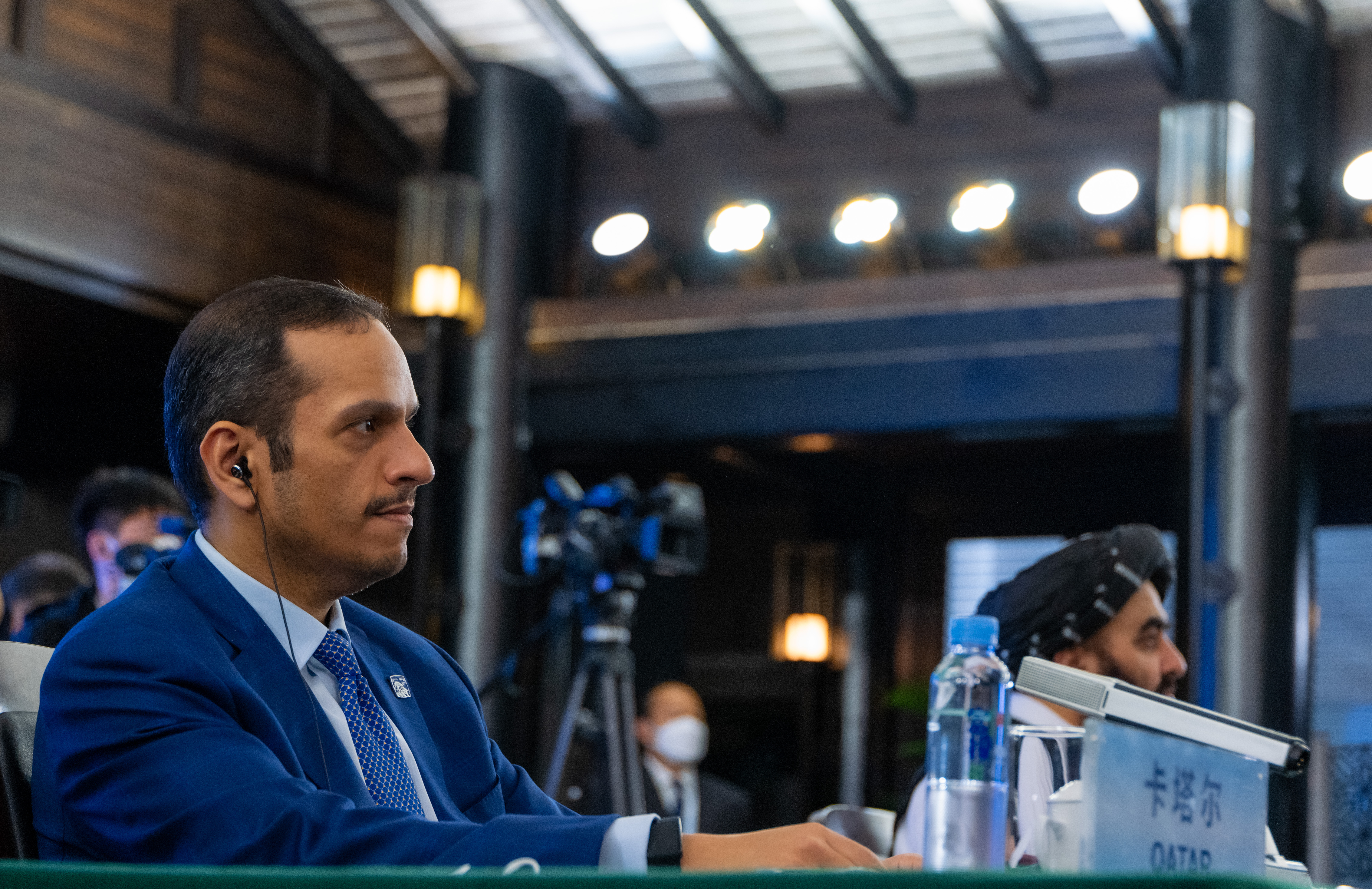Deputy Prime Minister and Minister of Foreign Affairs: Qatar Gives Special Priority to Regional and International Peace, Security

Huangshan - Information Office - March 31
HE Deputy Prime Minister and Minister of Foreign Affairs Sheikh Mohammed bin Abdulrahman Al-Thani participated Thursday in the third Foreign Ministers' Meeting Among the Neighboring Countries of Afghanistan, held in China.
In a speech before during the meeting, HE reiterated the State of Qatar's firm and supportive position towards the Afghan people and their right to live with dignity and achieve their aspirations, stressing the continuation of Qatar's endeavors through the good relations with all Afghan components, in order to support and facilitate efforts to reach a comprehensive political consensus that achieves security and stability in Afghanistan and the region.
HE noted that Qatar's good efforts to mediate between the US and the Taliban ended with the two parties signing the Doha Agreement for Bringing Peace to Afghanistan in February 2020, adding that these efforts continued to bring the parties to the Afghan conflict closer, until the previous government left Afghan territory in August last year.
His Excellency the Deputy Prime Minister and Minister of Foreign Affairs said that the State of Qatar contributed humanitarianly by establishing the largest airlift in history, which helped in evacuating more than 75,000 people of different nationalities from Afghanistan, and securing their transit through Doha to their last stations, noting that the State of Qatar continues to deliver humanitarian and medical aid to the Afghan people through its various governmental and civil institutions, besides friendly countries, international partners, and relevant international organizations.
HE said that since the first day, the State of Qatar called for humanitarian aid not to be politicized, out of its belief that this aid is a temporary solution, affirming the importance of moving to development work, promoting stability and economic recovery, and addressing the liquidity crisis that Afghanistan suffers from.
His Excellency also affirmed the necessity and importance of the Afghan caretaker government to continue the fight against terrorism, in particular ISIS-Khorasan, as well as the promotion of human rights, especially the right of women to work, and the right of Afghan girls to education.
The challenges facing the Afghan caretaker government can only be overcome with the cooperation of all, HE underlined, praising in this regard the important role played by many countries to achieve stability in Afghanistan, especially the Afghan neighboring countries. He also expressed the State of Qatar's aspiration to work with everyone to achieve stability and sustainable development in Afghanistan.
HE explained that the State of Qatar gives the regional and international peace and security a special priority, as its principles and goals are based on the Charter of the United Nations, and the rules of international legitimacy that call for cooperation and mutual respect, non-interference in the internal affairs of states, and the adoption of peaceful means and good endeavors to solve disputes.
HE the Deputy Prime Minister and Minister of Foreign Affairs expressed the State of Qatar's thanks to the People's Republic of China for all its endeavors and efforts to organize the meeting at this critical time, and under these exceptional circumstances that the region and the world are going through. HE also expressed his thanks to HE State Councilor and Foreign Minister of the People's Republic of China Wang Yi for inviting HE to this meeting.
Addressing participants in the meeting, His Excellency expressed hope to achieve the desired cooperation to support the stability of Afghanistan and the region, and to achieve the brotherly Afghan people's dream, in order to bring Afghanistan out of the tragedy into a space of hope.
The participating countries in the meeting are Qatar, Iran, China, Pakistan, Uzbekistan, Tajikistan and Turkmenistan.
The meeting will discuss the assessment of the coordination and cooperation mechanism among neighbors of Afghanistan, which was launched at the first ministerial meeting, by shedding the light on further strengthening of coordination and cooperation on issues related to Afghanistan, encouraging it to adhere to a broad and inclusive political orientation, implementing moderate and stable domestic and foreign policies, seriously protecting the rights and interests of ethnic minorities and women and children, resolutely combating terrorism and developing friendship and cooperation on the basis of good-neighbourliness.
The meeting also focuses on expanding multilateral coordination and supporting the United Nations in playing a key coordinating role in maintaining stability, preventing chaos, and providing emergency assistance, as well as strengthening cooperation in combating terrorism through bilateral and multilateral dialogue, and building a united front against terrorism through multilateral platforms, such as the United Nations and the Shanghai Cooperation Organization (SCO).
This year's meeting will discuss ways to promote peaceful reconstruction with the help of Afghanistan's neighboring countries by gradually expanding economic and trade exchanges, and making sure that international and regional organizations, especially United Nations agencies and relevant members of the United Nations Security Council, should assume their responsibilities to advance the political settlement of the Afghan issue.
Pakistan hosted the first meeting on Sep. 8, 2021, with the participation of the six neighboring countries of Afghanistan, namely Iran, China, Pakistan, Uzbekistan, Tajikistan and Turkmenistan. The second meeting was held in Iran on Oct. 27, 2021, with the participation of the Russian Foreign Minister and the UN Secretary-General.

